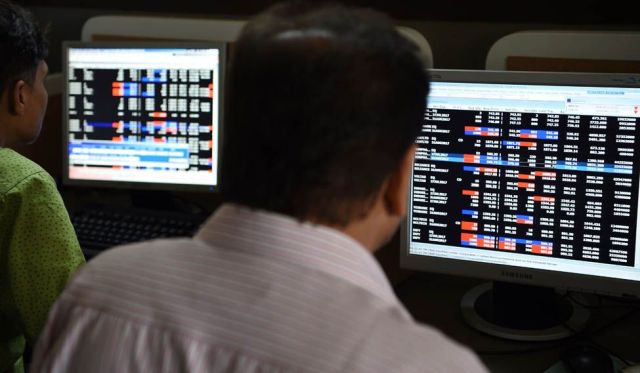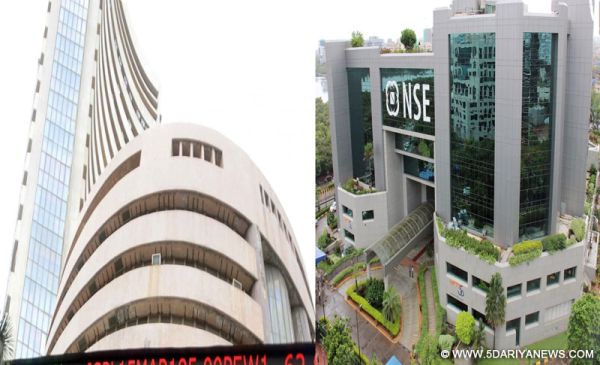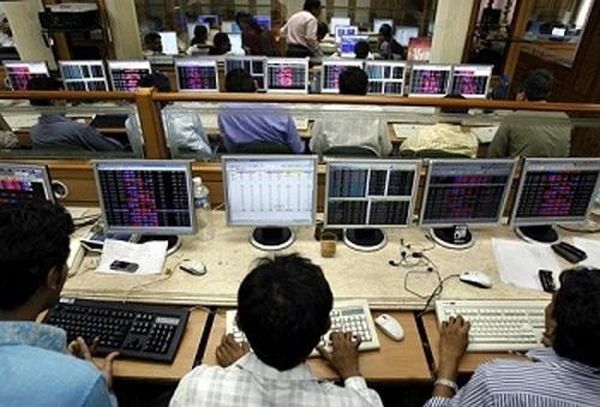
by Editor | May 25, 2021 | Economy, Markets, News
 By Rohit Vaid,
By Rohit Vaid,
Mumbai : Upcoming macro-economic data points, coupled with the commencement of parliament’s winter session and global cues, especially crude oil prices, are expected to determine the trajectory of the key equity indices in the coming week.
According to market observers, other factors like the expectations on the outcome of the Gujarat assembly elections, along with the direction of foreign fund flows and the rupee’s movement against the US dollar will also impact investors’ risk-taking appetite.
“The macro-economic data, trend in global markets, investment by FPIs (foreign portfolio investors) and DIIs (domestic institutional investors), the movement of rupee against the US dollar and crude oil price movement will dictate trends on the bourses next week,” D.K. Aggarwal, Chairman and Managing Director of SMC Investments & Advisors, told IANS.
“In the coming week, Nifty is expected to trade in the range of 10,100-10,400 points.”
In terms of economic indicators, the automobile industry’s November sales data and Balance of Trade figures are expected to be released on Monday.
Other macro-data points like the IIP (Index of Industrial Production) and CPI (Consumer Price Index) will be released by the Central Statistics Office (CSO) on December 12 (Tuesday), followed by the Commerce Ministry’s release of WPI (Wholesale Price Index).
“The outcome of the Gujarat state election will be next important event for the market. Though the outcome of election has no meaningful impact on the economy, the market will be waiting to react to the political stance. For the week ahead, IIP, CPI and WPI data are key,” Vinod Nair, Head of Research at Geojit Financial Services, told IANS.
Besides the macro-data points, further appreciation in the rupee’s value against the US dollar and likelihood of foreign fund inflows can enhance investors’ participation.
On a weekly basis, the Indian rupee strengthened by only two paise to close at 64.45 against the US dollar from its last week’s close at 64.47.
“Next week, we expect the rupee to trade strong as market prices in the strong possibility of a NaMo victory in the state elections. Over the next week, we expect a range of 64.25-64.60 on spot,” Anindya Banerjee, Deputy Vice President for Currency and Interest Rates with Kotak Securities, told IANS.
“In case 64.25 support gives way, we expect rupee to head to 63.80 levels.”
In addition to Indian currency, provisional figures from the stock exchanges showed that foreign institutional investors (FIIs) off-loaded stocks worth Rs 4,772.85 crore.
Figures from the National Securities Depository (NSDL) revealed that FPIs divested equities worth Rs 4,088.89 crore, or $634.5 million, from December 4-8.
On the technical charts, the NSE Nifty shows an underlying downtrend.
“Technically, while the Nifty has bounced back smartly, the underlying trend remains down,” said Deepak Jasani, Head of Retail Research for HDFC Securities.
“The Nifty would need to cross the previous intermediate highs of 10,410 points to reverse the current downtrend. Immediate supports to watch for resumption of weakness is at 10,094 points.”
Last week, the key Indian equity indices — the BSE Sensex and the NSE Nifty50 — rose on the back of global cues, along with healthy influx of DII funds and expectations of a political victory for BJP in the Gujarat assembly elections.
Consequently, the 30-scrip Sensitive Index (Sensex) of the BSE rose by 201.26 points, or 0.61 per cent, to close at 33,034.20 points.
Similarly, the Nifty50 of the National Stock Exchange (NSE) edged higher by 143.85 points, or 1.42 per cent, to close the week’s trade at 10,265.65 points.
(Rohit Vaid can be contacted at rohit.v@ians.in )
—IANS

by Editor | May 25, 2021 | Banking, Economy, Markets, News
 By Rohit Vaid,
By Rohit Vaid,
Mumbai : The central bank’s upcoming monetary policy review, combined with the direction of foreign fund flows are expected to drive investors’ sentiments in the equity markets in the coming week.
Market observers opined that other factors such as the rupee’s movement against the US dollar, global crude oil prices and further economic reforms will impact investors’ risk-taking appetite.
“RBI is scheduled to meet on December 6, 2017, and is expected to leave interest rates unchanged as inflation is inching up due to firming crude oil prices, increased financial market volatility and fiscal issues,” D.K. Aggarwal, Chairman and Managing Director of SMC Investments & Advisors, told IANS.
“Nifty is expected to trade in the range of 10,000-10,300 points levels, whereas Bank Nifty is expected to trade between 24,900-25,600 points levels.”
On technical levels, Deepak Jasani, Head – Retail Research, HDFC Securities, predicted a continued “short-term downtrend” for the Nifty after four consecutive sessions of correction.
“Nifty could now head towards the next supports of 10,050-10,094 points early next week,” Jasani said.
“Further downsides are likely if these supports fail to hold. Any pullback rallies could find resistance at 10,230 points.”
In its last review, the RBI had kept the key lending rate unchanged.
According to Devendra Nevgi, Founder and Principal Partner, Delta Global Partners, apart from the RBI’s rate decision, investors will also look to the language and cues on the future inflation scenario.
“Though the consensus is that RBI may not cut the repo rates, the language needs more attention if RBI turns more hawkish on sustained inflation and how the members’ votes split,” Nevgi told IANS.
Macro-data — Nikkei Services PMI — along with passenger vehicle sales will also determine the trajectory of the key indices on Monday, December 4.
Besides the macro-economic data points, volatility in the rupee’s movement against the US dollar and the direction of foreign fund flows could make investors nervous.
On the currency front, the rupee on Friday strengthened by 23 paise to close at 64.47 against the US dollar.
“Next week, the US dollar may react positively to the news that US Senate has approved the tax bill,” Anindya Banerjee, Deputy Vice President for Currency and Interest Rates with Kotak Securities, told IANS.
“As a result, USD/INR may inch higher towards 64.70-80 levels on spot with 64.30-35 acting as strong support. A range of 64.30 to 64.80 is expected over the near term.”
In terms of investments, provisional figures from the stock exchanges showed that foreign institutional investors (FIIs) offloaded stocks worth Rs 2,772.56 crore during the week ended November 27-30.
Last week, continuous outflows of funds, along with growing concerns over the country’s widening fiscal deficit as well as rising crude oil prices pulled the two key equity indices — S&P BSE Sensex and NSE Nifty 50 — lower.
Consequently, the barometer 30-scrip Sensex of the Bombay Stock Exchange (BSE) plunged 846.3 points, or 2.51 per cent to 32,832.94 points.
Similarly, the broader Nifty 50 of the National Stock Exchange declined by 267.9 points, or 2.58 per cent, to close at 10,121.80 points.
(Rohit Vaid can be contacted at rohit.v@ians.in)
—IANS

by Editor | May 25, 2021 | Economy, Markets, News
 By Porisma P. Gogoi,
By Porisma P. Gogoi,
Mumbai : GDP data for the second quarter of the 2017-18 fiscal, along with expiry of derivatives and the movement of foreign funds, are expected to be the main indicators to give direction to the key Indian equity indices in the upcoming week.
Apart from global cues, over the coming weeks, markets will seek direction from future events like the Reserve Bank of India policy meet during the first week of December and the Gujarat elections the following week.
“Focus in the coming week will be on the GDP numbers for the September quarter due to be released on November 30. Consumption growth is likely to be impacted by GST implementation during Q2FY18 and private sector capex continued to remain weak,” Teena Virmani, Vice President – PCG Research at Kotak Securities, told IANS.
“RBI policy in the first week of December and Gujarat elections in the second week are also being eyed closely. The rise in crude prices has left very little scope for RBI to cut rates in the upcoming meeting,” said Virmani.
Virmani pointed out that at the global level, the movement of oil prices will be closely watched as geo-political tensions in the Middle East are likely to remain supportive of oil prices in the run-up to the November OPEC (Organisation of the Petroleum Exporting Countries) meeting.
Other analysts have noted the November derivatives’ expiry and the direction of the flow of funds as the major triggers for the week starting November 27.
D.K. Aggarwal, Chairman and Managing Director of SMC Investments and Advisors, said: “The Indian markets may remain volatile as investors churn portfolios ahead of the monthly derivatives contract expiry on Thursday.”
“Also, the flow movement of foreign funds and domestic funds will play a critical role in giving direction to the market,” Aggarwal told IANS.
Provisional figures from the stock exchanges showed that domestic institutional investors (DIIs) bought scrips worth Rs 2,925.56 crore during last week. However, foreign institutional investors (FIIs) continued to remain net sellers, shedding stocks worth Rs 1,870.27 crore.
Figures from the National Securities Depository Ltd. (NSDL) revealed that foreign portfolio investors (FPIs) invested in equities worth Rs 2,106.45 crore, or $325.16 million, during November 20-24.
“Technically, with the Nifty rallying after two weeks of losses and also breaking out of the recent narrow trading range, the bulls seem to be in control. Further upsides are likely once the immediate resistance of 10462 is taken out,” Deepak Jasani, Head of Retail Research for HDFC Securities, told IANS.
Last week, the equity indices rode the bulls pursuing the optimism on a sovereign ratings upgrade of the Indian government’s bonds by US credit rating agency Moody’s a week before, supported by a further thrust given by continued buying by DIIs.
On a weekly basis, the barometer 30-scrip Sensitive Index (Sensex) of the Bombay Stock Exchange (BSE) closed higher from its previous week’s close by 336.44 points, or one per cent, at 33,679.24 points.
The broader Nifty50 of the National Stock Exchange (NSE) edged higher by 106.1 points, or 1.03 per cent, to close the week’s trade at 10,389.70 points.
(Porisma P. Gogoi can be contacted at porisma.g@ians.in)
—IANS

by Editor | May 25, 2021 | Economy, Investing, Markets, News
 By Rohit Vaid,
By Rohit Vaid,
Mumbai : Macro-economic data points and the direction of foreign funds’ flow are expected to influence sentiments of investors and set the tone for the Indian equity markets in the upcoming week, feel senior analysts.
Other important factors such as the geo-political situation in the Korean peninsula, rupee’s movement and government’s measures to tackle the non-performing assets (NPAs) will also have a major bearing on the stock markets.
Market observers pointed out that investors would take cues from the upcoming macro-economic inflation and industrial production data points.
The Central Statistics Office (CSO) will release the IIP (Index of Industrial Production) and CPI (Consumer Price Index) data points on September 12, Tuesday.
The CPI numbers will be followed by that of foreign trade figures and the release of WPI (Wholesale Price Index) data on September 14.
“Next week is going to be data heavy with the release of CPI, IIP and WPI. These are expected to have a major impact on the markets,” Dhruv Desai, Director and Chief Operating Officer of Tradebulls, told IANS.
“These macro-economic data points will also be viewed keeping an eye out on the earnings growth.”
Besides the macro-economic data, geo-political developments and a slowdown in domestic investment flows are likely to make investors nervous.
“Global geo-political development, especially the one taking place in the Korean peninsula, will be keenly followed by the investors,” Devendra Nevgi, the Zyfin Advisors Chief Executive, said.
“After large outflows of foreign funds, even domestic funds slowed down last week. This trend needs to be tracked as high prices, which are based mostly on PE expansion, might not sustain on such levels with a slowdown in domestic flows,” Nevgi explained.
Provisional figures from the stock exchanges showed that DIIs (domestic institutional investors) bought scrips worth Rs 1,210.12 crore last week. But, foreign institutional investors (FIIs) continued with their selling spree and off-loaded stocks worth Rs 3,426.51 crore.
Figures from the National Securities Depository (NSDL) revealed that foreign portfolio investors (FPIs) divested equities worth Rs 3,409.13 crore, or $531 million, during September 4-8.
In addition to investments, Indian currency’s movement against the US dollar would be closely watched by investors. The Indian rupee strengthened by 23 paise on a week-on-week basis to close at 63.79 to a US dollar from its previous week’s close of 64.02-03.
“A strong macro story and positive risk environment will continue to favour rupee. We expect a range of 63.70 to 64.20 over the near-term on spot,” Anindya Banerjee, Deputy Vice President for Currency and Interest Rates with Kotak Securities, told IANS.
On technical levels, the NSE Nifty is in a consolidation phase in a range of 9,861-9,983 points, according to Deepak Jasani, Head – Retail Research, HDFC Securities.
“Further directional cues are likely to emerge on a move beyond this range,” Jasani said.
Last week, global cues and sustained outflow of foreign funds dragged the key equity indices in the red after three consecutive weeks of gains.
Consequently, the 30-scrip Sensitive Index (Sensex) of the BSE declined by 204.71 points or 0.64 per cent to 31,687.52 points from its previous week’s close.
Similarly, the NSE Nifty50 closed at 9,934.80 points, down 39.6 points or 0.4 per cent.
(Rohit Vaid can be contacted at rohit.v@ians.in)
—IANS



